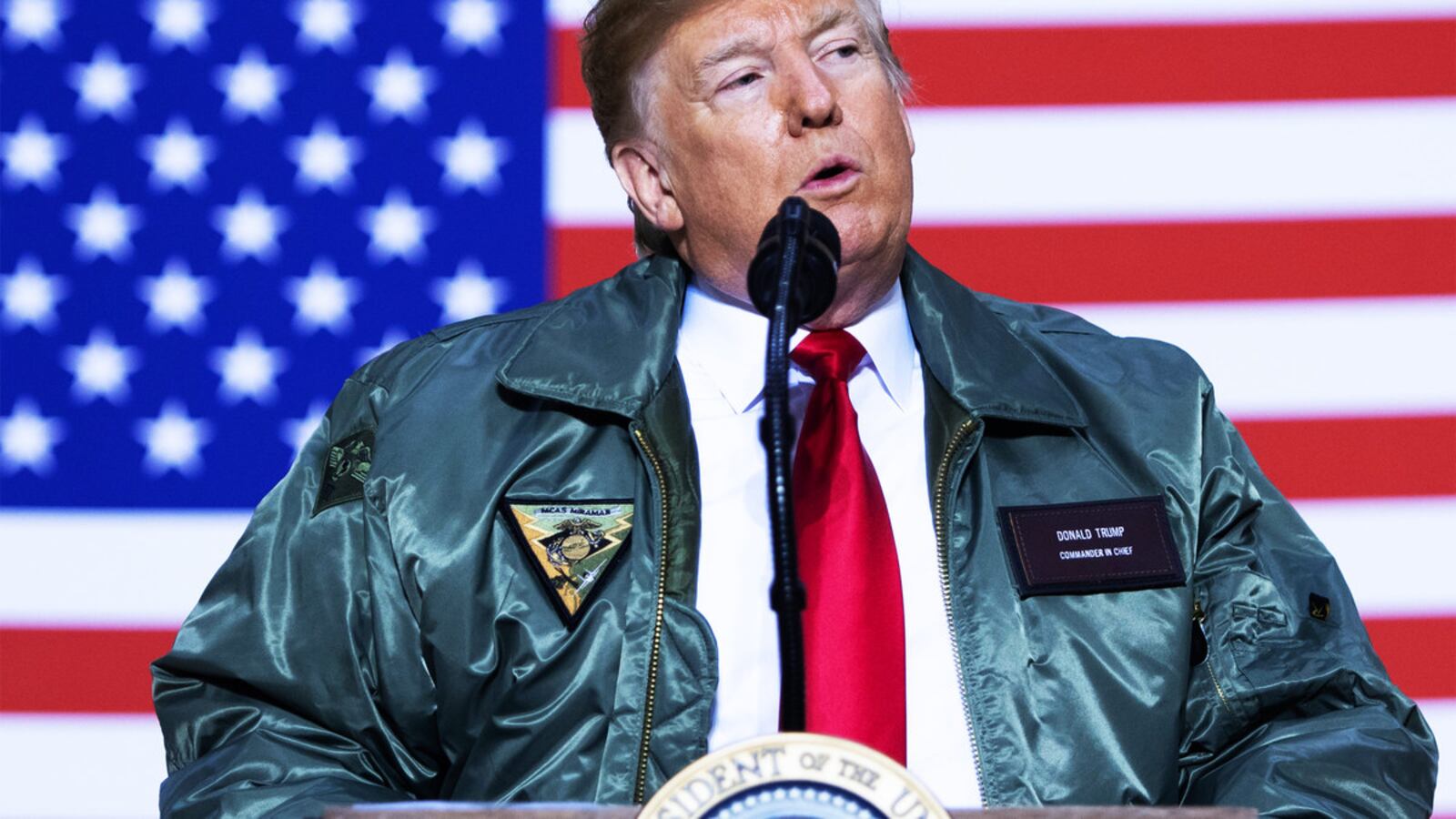It was barely a year ago that the U.S. outmaneuvered Qassem Soleimani to install Adil Abdul-Mahdi as Iraq’s prime minister. But with Soleimani dead in a U.S. drone strike, the U.S. is treating the Iraqi government that U.S. forces created during the 2003-2011 occupation as little more than an adjunct of Iranian strategy.
As the Iranians vow that revenge for Soleimani will include the eviction of the U.S. from the Middle East (Tehran’s longtime goal), the administration is refusing even to talk with the Iraqis about leaving, dismissing out of hand the very vocal insistence of Abdul-Mahdi and the Iraqi legislature that the Americans get out.
While it’s not as if the U.S. typically respects Iraqi sovereignty, the Trump administration’s hostility toward Baghdad shows the U.S. doesn’t need Iranian interference to undermine its position in a country it once considered a cornerstone of its presence in the region.
On Friday, Mahdi reiterated that he wants to discuss getting the U.S. out. But the State Department, in a statement about a “continued partnership,” ruled out any such discussion.
“At this time, any delegation sent to Iraq would be dedicated to discussing how to best recommit to our strategic partnership—not to discuss troop withdrawal, but our right, appropriate force posture in the Middle East,” read Friday’s statement, attributed to department spokeswoman Morgan Ortegus.
The U.S. military command in Iraq did not respond to a request for comment.
The State Department response struck some observers as an escalation–not against Iran but against Iraq, though one that would redound to Iran’s benefit.
“This will likely be seen by Iraqi officials as a refusal to discuss withdrawal, which in turn will solidify their demands for withdrawal,” said Douglas Lute, a retired Army lieutenant general who was White House coordinator for Iraq and Afghanistan for Presidents George W. Bush and Barack Obama. “Ending the U.S. presence and partnership in Iraq is the strategic goal most important to Iran. [It] will take the long strategic view, not obstructed by tactics, even tactics like the killing of Soleimani.”
“We are disappointed that the State Department does not seem interested in working with the Iraqi government on a plan to safely withdraw American forces from Iraq,” said Dan Caldwell of Concerned Veterans for America.
“The State Department is treating the preferences of a sovereign country and current strategic partner as if they are irrelevant,” added William Ruger of the Charles Koch Institute. “This violates the original war aims of Operation Iraqi Freedom of creating a free and democratic Iraq. Instead, it treats Iraq as merely a means for its imprudent maximum pressure campaign against Iran that promises greater hostilities when we should be finding a diplomatic resolution of our differences and the ultimate withdrawal of U.S. troops from Iraq and Syria.”
Ever since the Iraqi parliament voted to kick the U.S. out, the administration has tacitly insisted that the vote wasn’t legitimate. President Donald Trump threatened to sanction an allied country that in 2014 invited its former occupier back to fight the so-called Islamic State. Ortegus’ statement conspicuously said that the U.S. seeks “a conversation between the U.S. and Iraqi governments not just regarding security, but about our financial, economic, and diplomatic partnership.”
Earlier this week, after a confusing letter from a one-star general seemed to accept the untenability of the U.S. military presence, Defense Secretary Mark Esper insisted, flatly, that the U.S. would not leave. A parliamentary vote to expel the U.S. just “shows the support of the–of most Iraqis for our presence in the country,” in Esper’s telling.
He reasoned that most Sunni and Kurdish parliamentarians didn’t vote. “Those Shias who did vote, many of them voted at the threat of a–of their own lives by Shia militia groups,” Esper asserted.
But Ilan Goldenberg, who dealt with Mideast issues for the Pentagon and State Department in the Obama administration and who advises Elizabeth Warren’s presidential campaign, said that Esper undermined his own point by dismissing an official act of a sovereign government.
“Iraq’s biggest nightmare is to end up as the chessboard on which Iran and the U.S. duke it out, and with killing Soleimani, we pretty much fulfilled all their worst fears,” said Goldenberg.
In the days since the strike, Trump has complained to those close to him that various advisers keep telling him that he would look “weak” and risk a harsh backlash from some GOP lawmakers if he were to actually pull out of Iraq, according to three sources familiar with the conversations. He’s told various people that he still wants out of Iraq and other countries, however, while still heeding for the moment the advice of his hawkish officials.
For the past week, senior administration officials have been in conversations with their Iraqi counterparts about the vote in parliament, according to both Iraqi and U.S. officials. As the Iran story unfolded in Washington, Iraqi officials in Baghdad consulted among themselves about how to handle whatever the U.S. was planning to do with its troops. Should the parliament continue to demand their ouster?
Officials in the prime minister’s office and in parliament convened to discuss options for continued U.S.-Iraq partnership on training and other anti-ISIS military operations with a roadmap for total American withdrawal. But for the most part, Iraqi officials waited on Washington to get back to them with a plan for staying, or leaving, or something in between.
As the week rolled on, and senior U.S. officials tried to answer Congress’ questions about the strike, Baghdad waited. Then, on Friday, it officially asked the administration what its plan for Iraq is–before the State Department issued its statement.
For years, U.S. officials have lamented Iran’s ability to outplay the U.S. in Iraqi politics–something that during the 2003-2011 war and afterward drove U.S. officials to dismiss inconvenient Iraqi political decisions.
Many on the right who opposed leaving Iraq in 2011, particularly the late Sen. John McCain and Sen. Lindsey Graham, ignored the lack of parliamentary support for a post-2011 basing agreement and treated withdrawal as a unilateral wish of the Obama administration.
On Friday in Baghdad, Iraqis continued their months-long protests against both Iranian and American domination.
One of the consistent features of the post-9/11 era is for American adversaries not to respond to the U.S. in ways that play to American strengths, but rather to ensnare the U.S. in protracted conflicts, political as well as military, that display U.S. weaknesses. Another is for the U.S. to declare victory at the outset of escalation, as Trump is doing after the Soleimani killing, before the full consequences of its actions manifest. A third is for the U.S. to learn the hard way that launching missile strikes can undermine the political outcomes it says it seeks, and empower the adversaries it launched those strikes against.
All that leads some to conclude that while the U.S. focuses on Iranian military responses to Soleimani, Iran can advance its interests in a more durable manner, particularly while the U.S. muscles its supposed friends.
“This is a delicate moment where some deft diplomacy can prevent us from being unceremoniously kicked out of Iraq,” said Goldenberg, now with the Center for a New American Security. “But the administration has decided to pursue sledgehammer diplomacy instead, precisely what does not work.”








